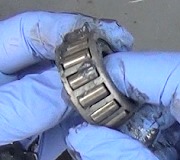Assuming you are able to install the wrong rotor, not all of the brake pads' friction material will make contact so that wheel will not have full stopping power. As a word of warning, you can be sure if someone else runs a red light and causes a crash, his lawyer or insurance investigator will find the wrong rotor and use it to convince a jury that you were partly at fault because you were less-able to avoid the crash, and he will be right. The same goes for lowered cars and raised trucks.
It is unlikely you will be able to install the larger rotor in place of the smaller one without it rubbing or interfering with the caliper. I would measure the diameter and the thickness to see if you actually got the correct rotor.
Also be aware we had a problem show up in the mid 1990's that we never saw before where a truck would stop just fine in a perfectly straight line, until after five or six successive hard stops, then the rotors and pads reached a certain temperature at which the coefficient of friction changed. When that change did not occur at exactly the same time on both sides, you would get surprised by a sudden and unexpected seriously-hard brake pull to one side. You could instantly end up in the ditch or in oncoming traffic with no warning. The problem was traced to recent brake jobs where everything was done perfectly fine, but the two rotors were machined to slightly different thicknesses. We normally only machine them as little as necessary to true them up. Any more material removal shortens their life expectancy. I have had cars with as much as 1/8" thickness difference in the rotors and never had a problem, but that was in the 1970's and 1980's. These trucks had as little as.007" and.020" difference. .007" is the thickness of two sheets of paper, and that is on rotors that are 1 1/8" thick.
That problem was on larger full-size trucks, particularly those with diesel engines because they are heavier and the brakes have to work harder, but it bares including here when you suspect your rotors are not matched.
Friday, October 21st, 2016 AT 10:41 PM


